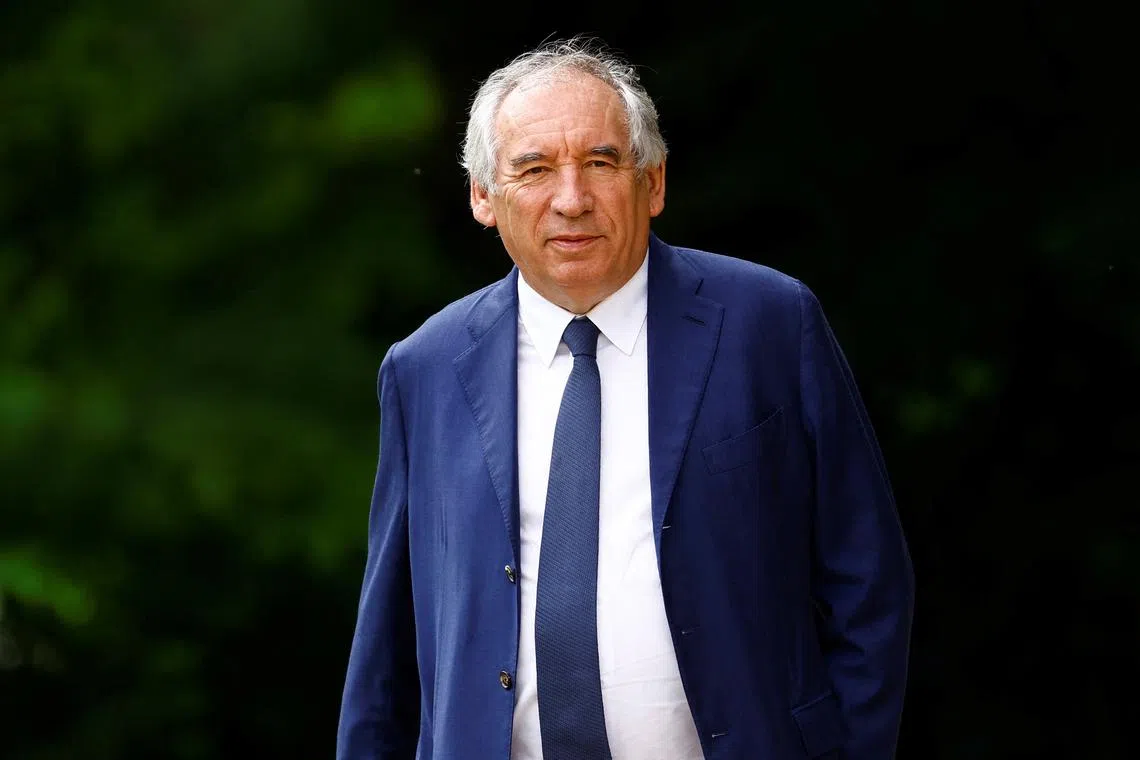France’s Macron names veteran centrist ally Bayrou as prime minister
Sign up now: Get ST's newsletters delivered to your inbox

The priority for Mr Francois Bayrou will be passing a special law to roll over the 2024 budget.
PHOTO: REUTERS
PARIS - French President Emmanuel Macron on Dec 13 named Mr Francois Bayrou his fourth prime minister of 2024, tasking the veteran centrist with steering the country out of its second major political crisis in the last six months.
The priority for Mr Bayrou, a close Macron ally, will be passing a special law to roll over the 2024 budget, with a nastier battle over the 2025 legislation looming early in the new year. Parliamentary pushback over the 2025 Bill led to the downfall of former prime minister Michel Barnier’s government
Mr Bayrou, 73, is expected to put forward his list of ministers in the coming days, but will likely face the same existential difficulties as Mr Barnier in steering legislation through a hung Parliament comprising three warring blocs. His proximity to the deeply unpopular Mr Macron will also prove a vulnerability.
Mr Jordan Bardella, president of the far-right National Rally (RN) party, said it would not be calling for an immediate no-confidence motion, while fellow RN leader Marine Le Pen said Mr Bayrou should listen to the opposition’s budgetary wishes.
Reaction to Mr Bayrou’s appointment on the left was more mixed.
Communist leader Fabien Roussel said his party would hold fire against Mr Bayrou, as long as he did not ram through legislation.
However, far-left France Unbowed party leaders said they would be seeking to remove Mr Bayrou, and Greens boss Marine Tondelier said she would support a no-confidence motion if Mr Bayrou ignored the party’s tax and pensions concerns.
France’s festering political malaise has raised doubts about whether Mr Macron will complete his second presidential term, which ends in 2027. It has also lifted French borrowing costs and left a power vacuum in the heart of Europe, just as Donald Trump prepares to return to the White House.
Mr Macron spent the days after Mr Barnier’s ouster speaking to leaders, from the conservatives to the communists, seeking to lock in support for Mr Bayrou. The RN and France Unbowed were excluded.
There was no immediate comment from the conservative Les Republicains party, which supported the previous government, nor from Socialist Party leaders, whose involvement in Mr Bayrou’s coalition may come with a hefty price tag in the 2025 budget.
“Now we will see how many billions the support of the Socialist Party will cost,” a government adviser said on Dec 13.
No legislative election before summer
Mr Macron will hope Mr Bayrou can stave off no-confidence votes until at least July, when France will be able to hold a new parliamentary election, but his own future as president will inevitably be questioned if the government should fall again.
Mr Bayrou, founder of the Democratic Movement party which has been part of Mr Macron’s ruling alliance since 2017, has himself run for president three times, leaning on his rural roots as the long-time mayor of the south-western town of Pau.
Mr Macron appointed Mr Bayrou as justice minister in 2017, but he resigned only weeks later amid an investigation into his party’s alleged fraudulent employment of parliamentary assistants. Mr Bayrou was cleared of fraud charges in 2024.
His first real test will come early in 2025 when lawmakers need to pass a belt-tightening 2025 budget Bill.
However, the fragmented nature of the National Assembly, rendered nigh on ungovernable after Mr Macron’s June snap election
Mr Barnier’s budget Bill, which aimed for €60 billion (S$85 billion) in savings to assuage investors increasingly concerned by France’s 6 per cent deficit, was deemed too miserly by the far right and left, and the government’s failure to find a way out of the gridlock has seen French borrowing costs push higher still. REUTERS


